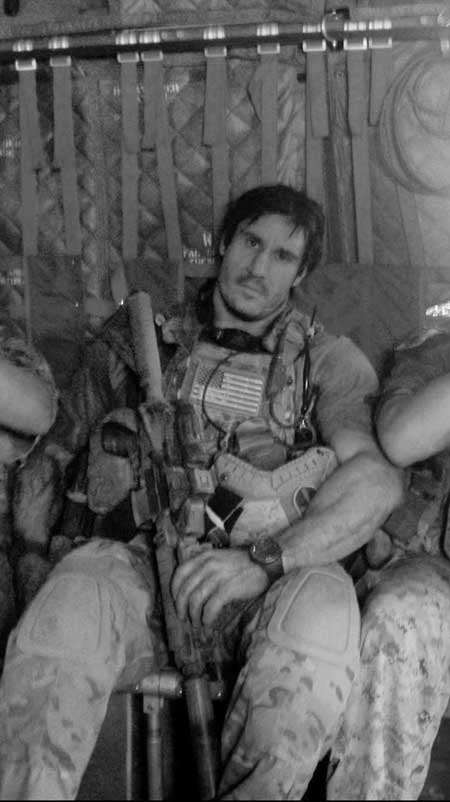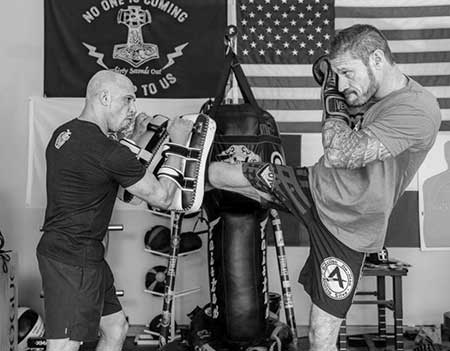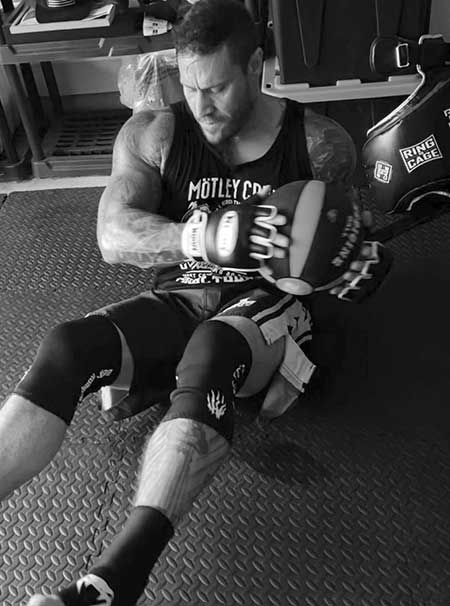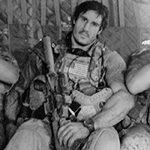Having spent 20 years in the U.S. military, most of it during the Global War on Terror, I’ve seen my share of deployments. I rotated into combat zones seven times as a Navy SEAL, twice as a member of Team 2, and five times as a member of the Tier 1 SEAL unit. Staying fit while deployed was part of my job, but it was also my therapy and coping mechanism. When family issues bubbled up back home or when our team lost men, I headed for the gym to keep myself sane.
I swam competitively in high school, but my real fitness journey began as a young, enlisted Marine. I grew up in the 1980s. Arnold Schwarzenegger was my hero. I wanted to be big and strong—performance be damned. I began lifting weights and loved it. Being big became part of my identity. During BUD/S I, of course, ran and swam but once I made my way to SQT (SEAL Qualification Training), it was all about the iron. I packed on more than 30 pounds of muscle during those six months and, when I showed up for my first job at SEAL Team 2, I was bulging out of my cammies.
I became a breacher, the guy whose job it is to remove physical obstacles such as doors and walls so that the rest of the team can do its thing. Breaching charges and tools are heavy, so my size and strength were assets— those same attributes also helped me kick and batter down doors. In hindsight, though, my fitness was not well-rounded. As I discuss in my book UNAFRAID: Staring Down Terror as a Navy SEAL and Single Dad, when it was time to prepare for the selection event for admission into the Tier 1 unit, I had to scramble to prepare myself for the running and the swimming. I made it through the rigors of both the selection and training without issue but carrying all that extra weight on the runs was never fun.
In terms of fitness, big boy rules applied once I was in the elite unit. There was no organized PT. Operators were expected to be physically prepared—end of story. We each fell into our own comfort zones. Swimmers swam, climbers climbed, runners ran, and meatheads like me lifted weights. With some age and wisdom on my side, I now recognize that I should have pushed myself out of my comfort zone more aggressively. Some guys did, and they were more well-rounded operators for it. If I’m going to be brutally honest with myself, I may have been more focused on looking like an action hero commando than optimizing my performance.
Even during deployments, bodybuilding-style workouts remained my staple. Fortunately, or perhaps unfortunately, I nearly always had a weight room at my disposal that allowed me to stay in this narrow fitness lane. This varied from place to place and ranged from some very well-equipped facilities to some that resembled a hotel gym with a lot more dust. This access to equipment was a luxury that a soldier or Marine on a remote outpost in Afghanistan would not likely have. These individuals must get creative, making do with minimal space and equipment. When we did find ourselves in such locations, which was usually only for a few weeks, we had to make do in a similar fashion. In some cases, there was so much danger from enemy fire that pushups and squats were the only options available. We always found a way.

My first taste of what a minimalist setup might look like on a long-term basis came after my military career, when COVID-19 shut down my beloved gym. Instead of the 129,000-square foot facility where I was accustomed to working out, I was relegated to a two-car garage crammed with all the accouterments that come along with four children at home. Not knowing how long the pandemic would last, my wife and I invested in kettlebells, a bench, an Olympic bar, a heavy bag, a variety of resistance bands, and some bumper plates. Though I used to poke fun at my teammate Eric Frohardt for his obsession with kettlebells, I now found myself relying on them daily for both swings and goblet squats. Guess what? I loved them.
Another life-changing event happened during this same period of time: I was diagnosed with type 2 diabetes. Diet became extremely important to me and, between that and my new training regimen, I shed 25 pounds over the course of several months. I felt better not carrying that weight around. I maintained my strength and increased my mobility significantly. As we grow older, this only becomes more important. Since COVID, I’ve put much of that weight back on but am still far more fit thanks to my emphasis on mobility training. I’ve also quit drinking, something that I should have done long ago.
My latest obsession is fight training, namely Brazilian Jiu-Jitsu and Muay Thai boxing. In addition to my resistance training workouts, I am doing fight training 2-4 days per week. All of the sudden, things such as size-to-strength ratios, mobility, and cardiovascular fitness have become very important to me. My workouts reflect that. I still love lifting weights and probably always will but, if I did it over again, I would definitely include more mobility work, compound movements, and fight training early on. Injuries are a constant threat to an operator, and I’ve had my share—being more mobile would have definitely helped me in that department.

Sample Joint Mobility Session
- Shoulder Mobility
- Internal and External Rotations
- Prone Scapular Retraction: T, Y, I, W
- Shoulder Elevation Variations
- TRX Reverse Flies Variations
- Thoracic Spine Rotation Variations
- Hip Flexor Mobility
- Supine Knee Tucks w/Pullup Bands
- Standing Hurdle Stretch Variations
- Glute Activation
- Mini Band Lateral Walk Variations
- Single Leg Deadlifts and RDLs
- Midsection
Equipment Used: Bodyweight, Mini Bands, Pullup Bands, Kettlebells, Cable Machine, Exercise/Physio Ball, TRX, Tennis and Lacrosse Balls, Pilates Block, Airex Foam Pads
Sample Training Week
- Monday—Strength training followed by Brazilian Jiu-Jitsu (Gi) class
- Tuesday—Mobility training, strength training
- Wednesday—Strength training followed by Brazilian Jiu-Jitsu or striking (boxing/Muay Thai) training
- Thursday—Mobility training, strength training
- Friday—Private 1-hour Brazilian Jiu-Jitsu session followed by 1-hour striking/pad work/sparring
- Saturday or Sunday—Strength training and the other day REST

My message to deploying soldiers, sailors, airmen, Marines, and contractors is this: strive to be a more well-rounded individual than I was when it comes to fitness. Force yourself outside of your comfort zone and do things you may not love doing. If you hate running, mix some runs into your workouts (just don’t ask me to do it). Strength is vitally important, but size alone shouldn’t be a priority. Don’t be afraid to try new things. Resistance bands are a great tool that you can pack anywhere—I only wish that I’d discovered them years earlier. There is an amazing amount of fitness-related scientific information available these days. Take full advantage.
On this Veterans Day, I want to take the time to thank each and every one of you who has served or is currently serving this great nation. It doesn’t matter whether you are a special operator, a conventional combat arms soldier, a logistics person, or someone processing paperwork, you all play an important role in defending this nation. We are one team. To those who are deployed: stay safe, stay strong, and punish your enemies.





